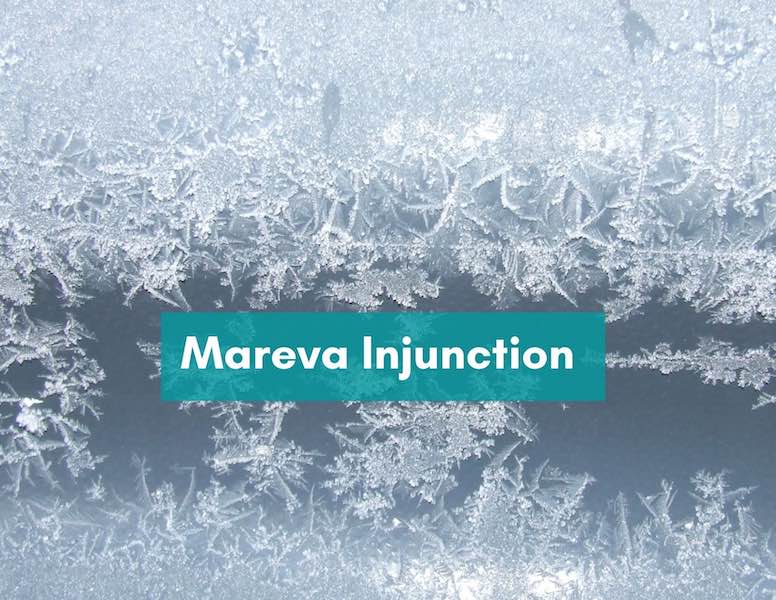Varying a Mareva Injunction (Part 2)
by Rachel Ng Li Hui ~ 31 December 2020
INTRODUCTION
I previously wrote about varying a Mareva Injunction here. Mareva Injunctions are a type of interlocutory ex parte injunction which restrains a defendant from removing, disposing, or concealing his or her assets which may be necessary to meet the plaintiff’s claim. More about the history of Mareva Injunctions can be found here.
A defendant can vary a Mareva Injunction when served with the same.
See: Chai Chup Seng Realty Sdn Bhd v Choo Hua Sang [1997] 2 CLJ 838.
LIVING EXPENSES
Even though a Mareva Injunction serves to freeze the defendants’ assets, Courts recognise that defendants will still need to survive and as such, can vary a Mareva Injunction to permit them to increase their provisions for living expenses.
See: Pharmmalaysia Bhd v Dinesh Kumar Jashbhai Nagjibha Patel & Ors [2005] 5 CLJ 50, wherein the defendants therein applied to stay the execution of the Mareva Injunction as, inter alia, the Mareva Injunction only allowed RM1,000 a week as living expenses. Abdul Malik Ishak J (as his Lordship then was) dismissed their stay application but explained that an application to vary the Mareva Injunction is to be preferred:
“A Mareva injunction too can be varied so as to permit a defendant to increase the requirements for his daily expenses. A classic example can be seen in the case of PCW (Underwriting Agencies) Ltd v. Dixon and Another [1983] 2 All ER 158 where the headnote at p. 158 carries the following statement of the law:
Held (I) The sole purpose of a Mareva injunction was to prevent a plaintiff being cheated out of the proceeds of an action, should it be successful, by a defendant transferring his assets abroad or dissipating his assets within the jurisdiction. The remedy was not intended to give a plaintiff priority over those assets, or to prevent a defendant from paying his debts as they fell due, or to punish him for his alleged misdeeds, or to enable a plaintiff to exert pressure on him to settle an action. Applying those principles to the facts, the injunction would be varied to allow the defendant sufficient funds to meet his reasonable living expenses, pay his outstanding debts and defend himself in the proceedings brought by the plaintiffs.”
The reason to allow for provisions (and variations thereof) of defendants in Mareva Injunctions is so that the Mareva Injunction will not become oppressive.
See: Larut Consolidated Bhd & Anor v Khoo Ee Bee & Ors [1997] 5 MLJ 77
Kamalanathan Ratnam JC (as his Lordship then was) made reference to the English Court of Appeal case of Law Society v Shanks [1988] 1 FLR 504 where the Court remarked:
“The order made was breathtaking in its width, and read literally, as all injunction were meant to be, especially if there was a penal notice at the end, prevented Mr Shanks from buying even a loaf of bread or having his ordinary expenses. ”
See also: Poly Electronic & Electrical (M) Sdn Bhd V Daewoo Corp (No 1) [2003] 2 MLJ 310
In the Poly Electronic case, Abdul Malik Ishak J (as his Lordship then was) held:
“Of course, it goes without saying that a Mareva injunction may be varied by the defendant particularly when the defendant has to use his assets to meet his ordinary living standard or his business expenses. But in order to do that the defendant must disclose all his assets within jurisdiction including those assets not within the court’s jurisdiction.”
PAYMENT OF LEGAL FEES
Courts can make orders to vary the terms of Mareva Injunctions to enable legal fees to be paid.
See: Bank Bumiputra Malaysia Bhd & Anor v Lorrain Esme Osman [1990] 3 MLJ 481, wherein the Court allowed one Lorrain Esme Othman to make his payment of legal expenses based on letters written by his solicitors quoting expected legal fees in respect of a habeas corpus application in Hong Kong and another case in the European Commission of Human Rights, both of which involve the question of his liberty.
See also: Malaysia Discounts Bhd & Ors v Pesaka Astana (M) Sdn Bhd & Ors [2008] 5 MLJ 1, CA (“Pesaka”); Liputan Canggih Sdn Bhd & Ors v K&A Management Sdn Bhd & Ors [2019] MLJU 1882 (“Liputan”)
However, whether such an order will be made also hinges on the circumstances of each case.
See: Metrowangsa Asset Management Sdn Bhd & Anor v Ahmad B Hj Hassan & Ors [2005] 1 MLJ 654 (“Metrowangsa”)
In Metrowangsa, Abdul Malik Ishak J (as his Lordship then was) refused to allow the defendants’ application to, inter alia, vary the Mareva Injunction for legal expenses. This refusal stems from the defendants’ constant change of solicitors.
BUSINESS OPERATIONS
In Metrowangsa, the Court explained that Mareva Injunctions can be varied to meet business expenses.
This is further explored in Pesaka, wherein the Court of Appeal highlighted the following as one of the established judicial principles in relation to Mareva Injunctions:
“A Mareva defendant is not required to justify and give special reasons whenever he applies for assets or specific funds to be released from a Mareva injunction, and whenever funds are sought to meet normal business obligations and expenses and legal costs, these should, as a matter of course, be released.”
This principle is further echoed in Bumi Armada Navigation Sdn Bhd v Mirza Marine Sdn Bhd [2015] 5 CLJ 652 (affirmed by the Court of Appeal and later referred in Liputan), Wong Kian Kheong JC (as his Lordship then was) explained:
“…as decided in Halifax Plc and PCW (Underwriting Agencies) Ltd, the court should allow a party subject to a Mareva injunction, to use the frozen assets for the party’s reasonable and ordinary operational expense if the party has no other assets except for the frozen assets.”
CONCLUSION
Liputan has succinctly shown that Courts can vary Mareva Injunction for, inter alia, the following 3 purposes:
- to pay for a defendant’s reasonable and ordinary living expense;
- to bear reasonable and ordinary operational expense of the defendant’s business; and
- to pay for the defendant’s legal advice and representation in the suit in question.
As such, a defendant can apply to vary a Mareva Injunction if it is for the above 3 purposes.

